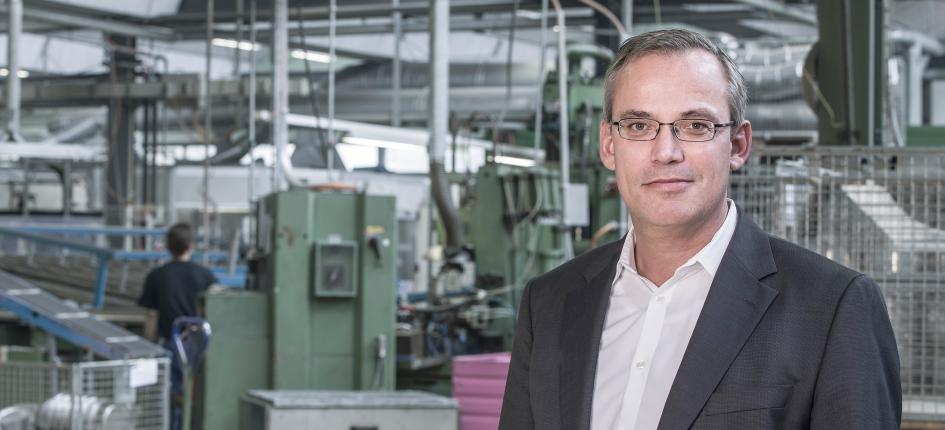Mr. Gerfin, your company has been operating internationally for a long time. Is it now more difficult to export, to grow internationally?
To a certain extent, yes: The huge fluctuations in the exchange rate have made export more difficult over the last few years. Another exacerbating factor is global price transparency in the online channel, which doesn’t take account of local specificities in cost structures. Nevertheless, I would say that the opportunities for growth on the international consumer goods market remain good, thanks to a growing middle class in certain regions of the world.
Are you noticing a trend towards more protectionism now in your business – above and beyond the political debates?
You find protectionism in lots of market regions, for example the extra duties in the EU on products from China. With this type of trade barrier, however, the situation has barely changed over the last few years, but the matter is very different when it comes to standards: Products by Kuhn Rikon come into contact with foodstuffs and must therefore meet strict requirements. Unfortunately, ever more local regulations are being applied in individual countries and regions that can’t always be explained as consumer protection.
Have you ever decided against approaching a new market because the trade barriers seemed insurmountable?
Kuhn Rikon has always consciously decided against entering markets in certain countries, but this has been due to various factors in each case, and not just trade barriers. As part of our strategy process in 2014, for example, there was intensive discussion of the Brazilian and Russian markets. Ultimately, we rated the risks in these countries, such as import duties, corruption or currency fluctuations, as considerably greater than the possibilities of a market launch. This was our reasoning for deciding against operations in these countries.
Where in the world is market entry particularly difficult?
Every country is challenging and so it doesn’t really make sense to rank them. For us, it’s important to adhere to the relevant local regulations wherever we are in the world, so that we are permitted to sell our products. The crucial thing is being prepared for the market launch. In lots of countries we therefore work with local distributors, who are familiar with the local specificities of the market, as well as the culture and the language. Otherwise it simply wouldn’t be possible for an SME like Kuhn Rikon to trade in almost 50 markets. Bilateral agreements, like that which Switzerland has with the EU, also make it much easier to enter a market, of course.
How does Kuhn Rikon approach entry into a new market?
As a first step, we always commission a market study with an external partner like Switzerland Global Enterprise (S-GE). External assessments are very important for an objective and critical examination of your own expansion project – and they are also the best way to rule out wishful thinking or prejudices. In 2015, for example, we reviewed the possibility of reentering the Japanese market with the help of an external market analysis. The crucial criteria for us are the methods of cooking within a country, the current and future purchasing power of households, the local distribution channels and the competition situation. While the first two points were rated very positively in Japan, the market analysis was ultimately skeptical with regard to access to distribution channels and the competition situation. As a result, we decided against a market launch.
What are your most important tips for SMEs wanting to grow internationally?
The important thing is to ask oneself the strategic question of what are the short- and long-term objectives in the new market, and to do so in advance of the market launch – precisely because developing a new market is often unprofitable and risky in the first few years. It’s also important to seek external assistance in the market evaluation. We have very good partners for these sorts of studies in Switzerland, whether it is S-GE or the local chambers of commerce. Cooperation with external partners should also be sought for the purposes of an effective market launch. Depending on the concept, these might be local business partners, such as agents or distributors, or independent organizations like S-GE. A market launch without local partners is far more risky.
Looking to the future, do you think globalization will intensify? Or will global trade become more limited in the future?
In many areas, globalization is unstoppable and will gain momentum from digitization, automation and effects of scale. At the same time, however, we have to consider that climate change, demographic shifts and the changes in the labor market as a result of Industry 4.0 will lead to protectionist interventions. Perhaps protective measures by the state are judged too harshly these days. You need only look to political economies like Singapore or South Korea to see how protective measures from the state can lead to very positive developments. Brands that are well positioned can sometimes be even more profitable in protected markets than in a free market.
Meet Tobias Gerfin at the Forum for Swiss Foreign Trade!
Do you want to find out more about trade barriers in export and benefit from practical advice on dealing with free trade agreements and WTO rules? Meet Tobias Gerfin and other interesting speakers at the Forum for Swiss Foreign Trade on April 26 at Messe Zurich.
About Tobias Gerfin
Tobias Gerfin received a doctorate from the ETH Zurich, then continued his career in industry, working at Bruker and Optrel before moving to Glas Trösch, where he took over the Interiors division in 2007. In 2010 he was appointed CEO at Stoll Giroflex AG. Since October 2013, Tobias Gerfin has been CEO of Kuhn Rikon AG.
About Kuhn Rikon
Kuhn Rikon is a family-run company with its own production facilities in Rikon, Switzerland. The SME’s products are marketed in 40 countries: Kuhn Rikon cookware and kitchen aids are available at more than 4,000 sales outlets worldwide.







